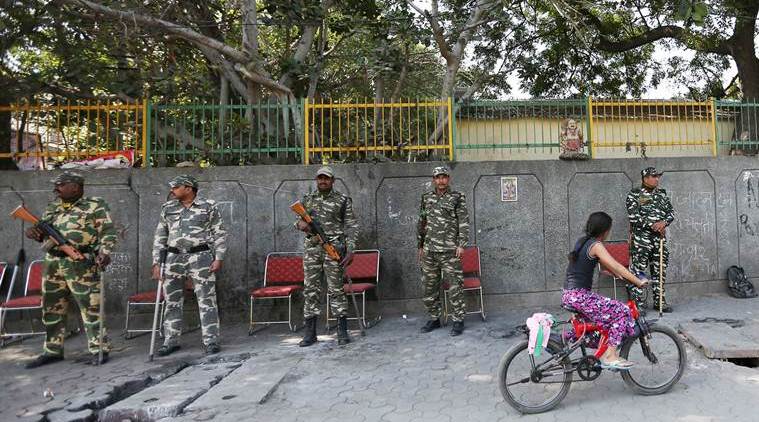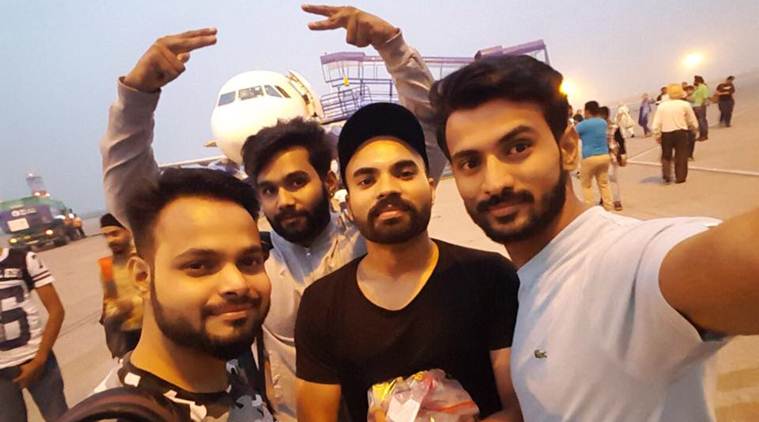The first to know about Sohail and Rekha’s affair in west Delhi’s Raghubir Nagar were the children. The year was 2003, the two 18-year-olds did not have access to mobile phones, WhatsApp or Facebook, and the only way to see each other was by playing Chinese Whisper with the colony kids. “I would tell the time, date and venue details to a group of children in my colony, they would tell children in Rekha’s colony, who would then inform her. The kids would relay information back to me in case she changed anything. Bachche humaare khabri they,” says Sohail, 34, over a cup of tea, at his friend’s office.
Once a week, the two would meet at a dhaba near Shivaji Park. “One plate of parathas for Rs 20, a bottle of water for Rs 10…this went on for three years. I am Muslim, she is Hindu. We had to hide this from our parents, they wouldn’t have approved,” says Sohail, who works as a driver.

One morning in 2006, Rekha ran away from her home, her mother chasing her through the cramped lanes of their neighbourhood, before she hid in a phone booth. “I was sleeping, she called me and said she had run away because her parents had found out about us…I left home too. We got married at Tiz Hazari court. Kitni filmi story hai humaari, picture bann sakti hai,” says Sohail, with a laugh.
Sohail and Rekha survived. Their parents eventually accepted the couple. Married for 12 years now, they have two children. “Hum dono ke beech kabhi mazhab nahi aaya (Religion never came between us),” says Sohail quietly.
On February 1 at Raghubir Nagar, a 23-year-old photographer — Ankit Saxena — got into an altercation with his girlfriend’s family who disapproved of their “relationship”. He was stabbed to death, allegedly by the father and maternal uncle of the 18-year-old woman, who belongs to a minority community. The police arrested the woman’s father, mother and a maternal uncle; her 16-year-old brother has been sent to a correctional home and the girl put in a shelter.
 Ankit Saxena was murdered earlier this month, allegedly by his girlfriend’s family. (Source: Express photo by Praveen Khanna)
Ankit Saxena was murdered earlier this month, allegedly by his girlfriend’s family. (Source: Express photo by Praveen Khanna)
Soon after the murder, communal tension simmered in Raghubir Nagar. Overnight, the colony turned into a fortress with heavy paramilitary and police deployment in the area. BJP MP Manoj Tiwari visited the victim’s family, as did Delhi Chief Minister Arvind Kejriwal. The Bajrang Dal sprung into action, got the two beauty parlours belonging to the woman’s family vacated within days, and also insinuated at informal meetings that minority communities move “elsewhere”.
For the interfaith couples of Raghubir Nagar, however, there is no “elsewhere”. Just like Ankit and his girlfriend of a few years, it was in these lanes that Sohail and Rekha, Karan* and Sarah*, Salim and Manju, and Sanjay and Zarina first met each other. Even as they ran away from their homes to get married, the winding lanes, the parchun ki dukaan, the common terraces and the nooks and crannies of Raghubir Nagar witnessed their love stories blossom. It is here that they would all eventually return to set up their homes.
Story continues below this ad
Bursting at the seams, the lanes of Raghubir Nagar are home to lower-middle class Hindus, Muslims, Christians and Sikhs. In close proximity to Rajouri Garden, where a large portion of the population settled after Partition, the pucca homes of the neighbourhood came about after two decades. “We moved here in 1971 and have lived here since. At that time, there were very few homes here, though the Gujarati community called the Waghris were already there. By the mid-’80s, it was a proper colony, with more pucca homes,” says Zoravar Singh, pradhan of NW Block, Raghubir Nagar.
Dotted with temples, gurdwaras and a few mosques, the area is known most for its second-hand cloth business run by the Waghris near Ghoda Mandir. “Hindus have rented homes to Muslims and vice versa, they do business together. Till that point, it’s fine because it’s about money. They even eat together. Bachpan mein humaari mummy ko pata nahi hota tha, hum kiske ghar kha rahe hai, kiski maa hume paal rahi hai (When we were young, our mothers didn’t know where we were eating or who was raising us). Parents know such friendships will be forged, it’s obvious. But when it comes to love, they all have a problem,” says Sunny Kumar, 34, a property dealer.
 We are in this together:: Ankit Saxena with his friends.
We are in this together:: Ankit Saxena with his friends.
Born and raised in Raghubir Nagar, Sunny “bhaiya” is a known “problem fixer’, and a “yaaron ka yaar”. His best friend Sohail vouches for that — after all, Kumar helped him run away and get married to his sweetheart Rekha. “In this colony, at every turn, you will find a Hindu-Muslim couple…most of them ran away and got married, some were accepted by their families, while some weren’t. There are always risks involved when an inter-faith couple get together, but no one had ever died because of it before Ankit,” says Kumar.
In fact, says Divyanshu, 23, Ankit’s friend, the boys in the area took pride in standing up for each other. “We named our group of friends, Awaara Boys, and we would pull pranks and post them on our Facebook page. We would visit temples, gurdwaras and mosques together. We could never imagine something like this could happen.”
Story continues below this ad
A few lanes away, at a hair salon, a bunch of boys is getting their hair styled like Punjabi rapper SukhE. Among them, Ankit Kumar, 22, who runs a call centre in Gurgaon, is showing his friends photos of his girlfriend on his phone. “She’s from Manipur, and she’s Christian. Isn’t she beautiful? My mother is okay with it but my father isn’t. He blackmails me that he will kill himself if I marry anyone other than a Valmiki girl — our community,” he says.
Although he is determined to not get swayed by his father’s “blackmail”, Ankit knows too well the power of family pressure. His elder sister married someone from a different caste a month ago, and Ankit was the only one from her family in attendance. “The groom was beaten up a few days before the wedding by some members of my family…we are not allowed to visit her anymore.
Even my elder brother was in a relationship with a Muslim girl for years before both our families objected so vehemently that they broke up. Tough life ahead for me, I know,” says Ankit.
At the salon, his friends tease him for finding a girl at all, for being the only “committed” person in the group. They also pledge their support. “Bade hote huye humne mazhab ki nazron se kisi ko nahi dekha (When we were growing up, we never looked at people through the lens of religion). It’s 2018 — religion cannot dictate how we live or love…par parents bolte hain samaaj kya kahega (But parents say what will society say). It makes no sense…I just want to earn a lot of money now, so I can marry her and live somewhere else. Shaadi toh pakki hai, ji,” he says.
Story continues below this ad
 Ankit Saxena during happier times.
Ankit Saxena during happier times.
A few weeks before he was murdered, Saxena, too, had mentioned his wedding plans to his group of childhood friends — the couple had picked a date, his birthday on March 22. “Her parents would have never approved, so they were going to get married in court. We were to be the witnesses…we never imagined it would come to this,” says his childhood friend, Ankit Rao, 26, whose mobile phone shop in Rohini would serve as the couple’s rendezvous spot.
Saxena and his girlfriend’s love story was a common enough one. The two grew up in the same lane, played hide-and-seek together as children, burst crackers on Diwali, devoured sevaiyyan on Eid, celebrated New Year’s eve. Like all other children of the lane, they addressed each other as “bhaiya” and “behen”. As they grew older, their feelings for each other changed.
Three years ago, the woman’s family allegedly shifted to another lane when they got a whiff of the budding romance. “She didn’t have a phone, so he gifted her one so they could talk. One day, that, too, was confiscated. Her birthday falls in July but he couldn’t gift her anything for fear of her parents finding out. Her mother scolded Ankit once and the couple stopped talking for a few months. Three-four days before he was killed, Ankit dropped her home and her brother saw them together. He told us they had to cut contact briefly. It was serious, but we didn’t see this coming. It all feels like a scene from a movie, that he will be back soon on his bike,” says the victim’s 19-year-old friend Aman Narang.
On that fateful evening, the girl cooked for her mother and then locked her in and ran away at about 7:45 pm. As she waited for Saxena at Tagore Garden metro station, her family got out of the house, and got into a fight with him on the road — which ended with her father allegedly stabbing Ankit to death. With the parents in jail and the girl in a shelter home, the rest of the family vacated the premises soon after. “No one wants to keep her…jo apne maa-baap ki nahi ho saki, woh kisi aur ki kaisi ho sakti hai (A person who couldn’t think of her parents can’t possibly think of anyone else)? Her family is in jail because of her,” says the woman’s maternal grandmother.
On a sleepy day, in a park near Saxena’s lane, a group of women is still discussing the incident that took place 10 days ago. Opinions are polarised about who is to blame. “If they had such a problem with the relationship, they could have kept their girl away, taken her back to their village,” says one. Another woman says, “A Hindu and a Muslim in a relationship is bound to cause trouble. I haven’t raised my children to be like this.”
Story continues below this ad
 Ankit Saxena’s room in Raghubir Nagar (Express photo by Gajendra Yadav)
Ankit Saxena’s room in Raghubir Nagar (Express photo by Gajendra Yadav)
Since the night of the incident, Sarah and Karan, who live in the same lane as the accused, have been inundated with calls from their families, urging them to keep a low profile. An inter-faith couple, the two have been married for a decade now, and have two children. “I am not scared of anyone but our families worry. I want to tell people about us as much as I can, so they can see how a Hindu man and a Muslim woman can live together and raise a family. Touchwood, humara pyaar kaayam hai,” says a chatty Sarah, as her husband — a DJ — gets ready for work.
It was at a party, where Karan was DJing, that the two met, and, six months later, ran away and got married in a court with their friends as witnesses. They rented a small apartment near Karan’s home, and, in less than a year, both their families accepted them. “My family saw how nice he was — he would take me to the dargah, learnt how to read Eid ki namaz. We celebrate Eid at home, his whole family comes over. We go to his parents’ house for Diwali and Holi, I sit and do puja with my mother in-law. If I ever need anything, they will be here for me. I am truly blessed,” says Sarah.
On friendly terms with the woman at the centre of this tragedy, Sarah inquires about her and wonders if she can visit her at the shelter home. A few days after the incident, when she began hearing murmurs of some Muslim families wanting to leave the colony, the 31-year-old held a meeting with the pradhan of the block. “Log bure hote hain, dharm nahi…we didn’t do anything, why should we be scared? Why should we leave? I was born in Raghubir Nagar, this is my home. My blood boils when people talk about religion, when news channels use the phrase ‘love jihad,’” says Sarah.
Her husband, Karan, 32, talks about their plan for raising their children — the “right” way. “We will teach them about both religions, like(Mani Ratnam’s) Bombay, the movie. One child has a Hindu name, the other a Muslim name. When they grow older, they can decide what they want to follow or if they want to follow any religion at all,” he says.
Story continues below this ad
Sohail and Rekha, too, have figured out how to raise their two children. “They don’t have a surname, we decided it was best to just let them have a first name. This way, people won’t guess their religion and stereotype them. We hope they grow up to be good human beings rather than just good Hindus or good Muslims,” says Sohail.
A few lanes away is another couple — Mohammad Salim, 42, a second-hand cloth merchant, and, his wife Manju, 36, a vegetable vendor. The two met in Raghubir Nagar when she was only 14. They ran away to Lucknow to get married a few months later, and returned home after six months. She converted to Islam soon after and is now known as Shabnam. “My mother lives in this lane as well, and she is Hindu. My children have Muslim parents, but their naani is Hindu. They are used to it. We all go to her house for Diwali, and they learn about Islam at home. They understand that all religions are equal this way, they know where their mother comes from. We have bigger things to worry about than religion — like putting food on the table and getting my girls married,” says Shabnam, as she oils her daughter’s hair outside their house. “Religion was never a criterion for me. All I wanted was a man who wasn’t abusive or alcoholic like my father. At that time, taking a risk was easier. But now, things are different. Mahaul thik nahi hai. I wouldn’t want my children to marry outside the faith they follow. What if they, too, get killed?” she says.
Shabnam’s concern is echoed by another couple who occupies a one-room apartment near the accused’s house. As their baby sleeps on their queen-sized bed, the two finish a bulk order of printing work, the smell of ink hanging in the air. Every knock on the door startles them. “You will get us evicted, please go away, leave us alone,” pleads the woman.
Next to their home is their Sikh landlady’s shop, from where she sells unstitched salwar-kameez. “I didn’t think twice before renting out the room to them. The boy has grown up in this lane. But his family hasn’t accepted the fact that he is married to a woman of a different religion. After this incident, they’re scared there can be trouble,” she says, on condition of anonymity.
Story continues below this ad
For Sanjay Kumar Naik, 35, who’s married to Zarina Begum, 30, it was a long courtship of a decade that finally resulted in the two running away to Jaipur in 2011 to get married. “Her brother wanted to kill her, at least, he threatened to after he found out we got married in a temple. Her family still doesn’t talk to us. I have no problem with her religion, She keeps two fasts on Ramzaan and also fasts for me on karwa chauth. We live with my parents, who love her,” says Naik, who works in a powder coating factory nearby. “My wife and I spoke about Ankit. It saddens us. What has love got to do with religion?” he asks.
It’s a sentiment that Saxena’s father Yashpal endorses even in his grief. Days after the murder of his son, the shattered father requested his neighbours and his son’s friends to not participate in a protest march organised by Bajrang Dal in the area. “I have no problem with any religion…I just want justice for my son. Please don’t communalise this,” he begged.
Since Saxena’s death, a steady supply of food and tea, mattresses and blankets for visiting relatives and arrangements for politicians are being made by his close friend Azhar, 22, and his mother Zeba. “We’ve been by their side all the time. My son also went to Haridwar to immerse Ankit’s ashes. This incident has not impacted our relationship with the family. But it has left me scared. I do hope Azhar doesn’t fall in love outside his religion. Times are not what they used to be,” says Zeba.
* Some names have been changed on request

 Dotted with temples, gurdwaras and a few mosques, Raghubir Nagar is known most for its second-hand cloth businesses run by the Waghris, a Gujarati tribal community. Seen here is the force deployed at the spot of murder. (Express photo by Gajendra Yadav)
Dotted with temples, gurdwaras and a few mosques, Raghubir Nagar is known most for its second-hand cloth businesses run by the Waghris, a Gujarati tribal community. Seen here is the force deployed at the spot of murder. (Express photo by Gajendra Yadav)
 Ankit Saxena was murdered earlier this month, allegedly by his girlfriend’s family. (Source: Express photo by Praveen Khanna)
Ankit Saxena was murdered earlier this month, allegedly by his girlfriend’s family. (Source: Express photo by Praveen Khanna) We are in this together:: Ankit Saxena with his friends.
We are in this together:: Ankit Saxena with his friends. Ankit Saxena during happier times.
Ankit Saxena during happier times. Ankit Saxena’s room in Raghubir Nagar (Express photo by Gajendra Yadav)
Ankit Saxena’s room in Raghubir Nagar (Express photo by Gajendra Yadav)





























